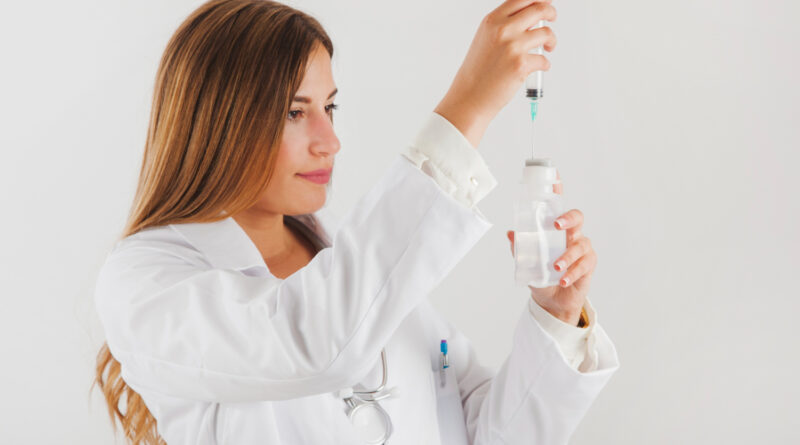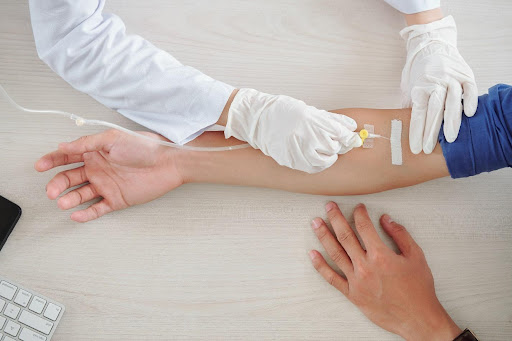What are the best IV fluids for dehydration?
Dehydration is a common health concern that occurs when the body loses more fluids or water than it takes in, leading to an imbalance in electrolytes and bodily functions. While mild dehydration can often be managed with increased fluid intake, severe cases may require more immediate and effective treatment options. Intravenous (IV) therapy has emerged as a reliable solution for rehydrating the body quickly and efficiently. However, accessing IV therapy for dehydration can be challenging, especially for individuals who cannot visit healthcare facilities promptly. This obstacle emphasizes the need for a convenient and accessible solution that brings IV therapy directly to those in need.
Vitamin IV Drip in Dubai provided by Call Doctor offers a unique and innovative approach to address dehydration while also boosting the immune system, ensuring optimal health and well-being for individuals in the comfort of their own homes.
Dehydration Due to Disease
Dehydration can occur as a result of various diseases and medical conditions. Gastrointestinal illnesses, such as gastroenteritis or food poisoning, often lead to excessive vomiting and diarrhea, causing significant fluid loss. Similarly, certain infections, such as urinary or respiratory tract infections, can result in fever and increased sweating, further exacerbating fluid depletion.
Chronic conditions like diabetes, kidney disease, and adrenal insufficiency can also contribute to dehydration due to their impact on bodily fluid regulation. It is crucial to closely monitor fluid intake and seek medical attention when experiencing dehydration due to underlying diseases to prevent complications and promote recovery.
Dehydration Due to Heat
Hot weather and high temperatures can cause excessive sweating and fluid loss, leading to dehydration. When exposed to intense heat, the body perspires to cool down, which can deplete essential fluids and electrolytes. Engaging in outdoor activities, exercising, or working in high-temperature environments without adequate hydration can increase the risk of dehydration. Drinking fluids, especially water, is vital during hot weather conditions. Additionally, taking breaks in shaded or air-conditioned areas, wearing light and breathable clothing, and avoiding prolonged sun exposure can help minimize the risk of dehydration due to heat.
Dehydration After Excessive Drinking
Alcohol consumption can contribute to dehydration due to its diuretic effects. When alcohol is consumed, it increases urine production, leading to fluid loss and electrolyte imbalances. Excessive drinking without enough water or hydrating fluids can result in symptoms such as thirst, headache, dizziness, and dry mouth. It is essential to practice responsible drinking habits and intersperse alcoholic beverages with water or non-alcoholic drinks to maintain hydration levels. Replenishing fluids before, during, and after consuming alcohol can help prevent dehydration and mitigate the discomfort associated with excessive drinking.
Dehydration After Surgery
Surgical procedures can cause dehydration due to various factors. Pre-surgical fasting and restricted fluid intake before anesthesia can lead to a state of dehydration. Additionally, surgical procedures often involve the administration of intravenous fluids or medications that can affect fluid balance in the body. Post-surgery, patients may experience reduced appetite, pain medication side effects, or limited mobility, which can contribute to decreased fluid intake and potential dehydration. It is crucial for surgical patients to follow the instructions provided by their healthcare team regarding fluid intake and to communicate any signs of dehydration promptly. Adequate hydration is essential for a smooth recovery and to promote optimal healing after surgery.
In all cases of dehydration, it is essential to recognize the signs and symptoms, such as thirst, dry mouth, dark urine, fatigue, and dizziness. Replenishing fluids by drinking water, electrolyte-rich beverages, or seeking medical attention in severe cases is necessary to restore the body’s fluid balance and maintain overall health and well-being.
When treating dehydration with intravenous (IV) fluids, choosing the best depends on the severity of dehydration, electrolyte imbalances, and individual patient needs. However, several commonly used IV fluids effectively replenish fluids and electrolytes. Here are some of the best IV fluids for dehydration:
Normal Saline (0.9% Sodium Chloride)
Normal Saline is a balanced solution containing sodium and chloride, which helps restore fluid volume and electrolyte balance. It is often the initial choice for treating dehydration, as it closely resembles the body’s natural fluid composition.
Lactated Ringer’s Solution
Lactated Ringer’s solution is another commonly used fluid that contains sodium, potassium, calcium, and lactate. It benefits patients with moderate dehydration and electrolyte imbalances, providing a more comprehensive electrolyte profile.
5% Dextrose in Water
This solution contains glucose (sugar) and water, providing a source of energy along with fluid replacement. It is often used when there is a need to address dehydration and hypoglycemia (low blood sugar).
Balanced Electrolyte Solutions
These solutions closely mimic the body’s electrolyte composition, including sodium, potassium, chloride, and bicarbonate. They are particularly useful in cases of severe dehydration or electrolyte imbalances.
The choice of IV fluid is determined by a healthcare professional based on the patient’s specific needs. Factors such as the extent of dehydration, electrolyte levels, medical history, and any underlying conditions are considered to ensure the most appropriate fluid is administered.
It is important to note that IV fluids should be administered under the supervision of healthcare professionals who can monitor the patient’s response and adjust the treatment as necessary. Additionally, individualized care and ongoing assessment are crucial to ensure the safe and effective management of dehydration with IV fluids.
Dehydration leads to insufficient water and electrolytes necessary for proper bodily function. There are several common reasons why dehydration happens:
Inadequate Fluid Intake
Not drinking enough fluids, especially during increased physical activity, hot weather, or illness, can quickly lead to dehydration. Failing to replenish fluids lost through sweating, urination, or other bodily functions can disrupt fluid balance.
Excessive Fluid Loss
Certain conditions or situations can cause excessive fluid loss, contributing to dehydration. It can include prolonged vomiting or diarrhea, high fever, excessive sweating without proper fluid replacement, or increased urination due to diabetes or diuretic medications.
Illness or Infection
Some diseases or infections, such as gastrointestinal infections, can cause significant fluid loss through vomiting or diarrhea. Fever associated with diseases can also increase fluid requirements and accelerate dehydration.
Chronic Health Conditions
Individuals or patients with chronic health conditions like diabetes, kidney disease, or adrenal insufficiency may have a higher risk of dehydration. These conditions can affect fluid balance and increase the body’s fluid needs.
Aging
The body’s ability to conserve water and sense thirst may decline as we age. Older adults may be more susceptible to dehydration due to a reduced sense of thirst or limited access to fluids.
Intense Physical Activity
Engaging in rigorous physical activity, especially in hot or humid environments, can cause significant fluid loss through sweating. Failure to replenish fluids adequately during and after exercise can lead to dehydration.
IV therapy services at home in Dubai
Preventing dehydration involves maintaining a regular intake of fluids, especially water, and adjusting fluid intake during increased activity, illness, or exposure to heat. Listening to the body’s thirst signals and consuming fluids even before feeling thirsty is essential.
In cases of moderate to severe dehydration, medical attention may be necessary, and intravenous (IV) fluids may be administered to restore fluid and electrolyte balance quickly. Promptly addressing dehydration prevents complications and maintains overall health and well-being. Contact Call Doctor if you want to get IV therapy Dubai. Visit their website or contact them by phone.


